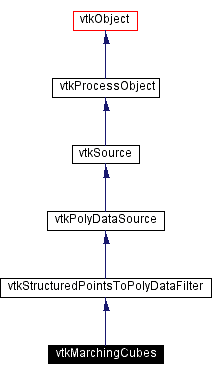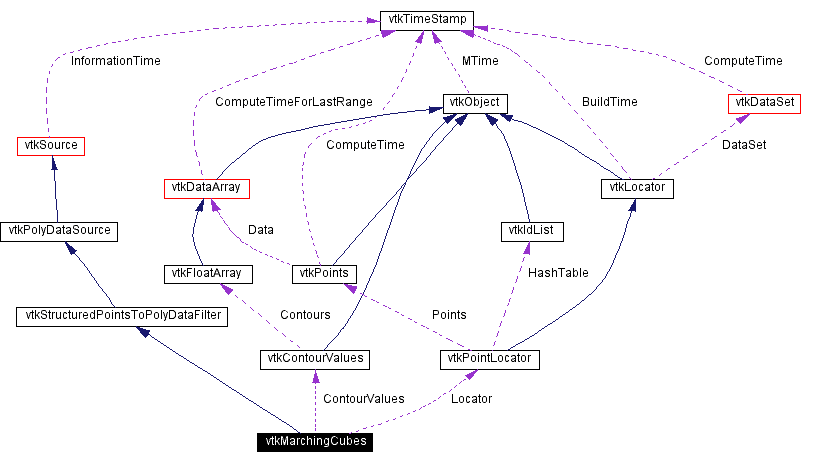Main Page Class Hierarchy Alphabetical List Compound List File List Compound Members File Members Related Pages
vtkMarchingCubes Class Reference
#include <vtkMarchingCubes.h>
Inheritance diagram for vtkMarchingCubes:
 [legend]
[legend]Collaboration diagram for vtkMarchingCubes:
 [legend]List of all members.
[legend]List of all members.
Detailed Description
generate isosurface(s) from volume
- Date:
-
2002/08/30 21:05:16
- Revision:
-
1.62
vtkMarchingCubes is a filter that takes as input a volume (e.g., 3D structured point set) and generates on output one or more isosurfaces. One or more contour values must be specified to generate the isosurfaces. Alternatively, you can specify a min/max scalar range and the number of contours to generate a series of evenly spaced contour values.
- Warning:
-
This filter is specialized to volumes. If you are interested in contouring other types of data, use the general vtkContourFilter. If you want to contour an image (i.e., a volume slice), use vtkMarchingSquares.
- See also:
-
vtkContourFilter vtkSliceCubes vtkMarchingSquares vtkDividingCubes
- Created by:
-
- CVS contributions (if > 5%):
-
- Schroeder, Will (48%)
- Lorensen, Bill (31%)
- Martin, Ken (8%)
- CVS logs (CVSweb):
-
- .
cxx (/Patented/vtkMarchingCubes.cxx) - .
h (/Patented/vtkMarchingCubes.h)
- Tests:
-
vtkMarchingCubes (Tests)
Definition at line 75 of file vtkMarchingCubes.h.
Member Typedef Documentation
Constructor & Destructor Documentation
| vtkMarchingCubes::vtkMarchingCubes |
( |
|
) |
[protected] |
|
| vtkMarchingCubes::~vtkMarchingCubes |
( |
|
) |
[protected] |
|
Member Function Documentation
| vtkMarchingCubes* vtkMarchingCubes::New |
( |
|
) |
[static] |
|
|
|
Create an object with Debug turned off, modified time initialized to zero, and reference counting on.
Reimplemented from vtkObject. |
| virtual const char* vtkMarchingCubes::GetClassName |
( |
|
) |
[virtual] |
|
| int vtkMarchingCubes::IsTypeOf |
( |
const char * |
type |
) |
[static] |
|
|
|
Return 1 if this class type is the same type of (or a subclass of) the named class. Returns 0 otherwise. This method works in combination with vtkTypeRevisionMacro found in vtkSetGet.h.
Reimplemented from vtkStructuredPointsToPolyDataFilter. |
| virtual int vtkMarchingCubes::IsA |
( |
const char * |
type |
) |
[virtual] |
|
|
|
Return 1 if this class is the same type of (or a subclass of) the named class. Returns 0 otherwise. This method works in combination with vtkTypeRevisionMacro found in vtkSetGet.h.
Reimplemented from vtkStructuredPointsToPolyDataFilter. |
| vtkMarchingCubes* vtkMarchingCubes::SafeDownCast |
( |
vtkObject * |
o |
) |
[static] |
|
| void vtkMarchingCubes::PrintSelf |
( |
ostream & |
os, |
|
|
vtkIndent |
indent |
|
) |
[virtual] |
|
|
|
Methods invoked by print to print information about the object including superclasses. Typically not called by the user (use Print() instead) but used in the hierarchical print process to combine the output of several classes.
Reimplemented from vtkStructuredPointsToPolyDataFilter. |
| void vtkMarchingCubes::SetValue |
( |
int |
i, |
|
|
float |
value |
|
) |
[inline] |
|
| float vtkMarchingCubes::GetValue |
( |
int |
i |
) |
[inline] |
|
| float * vtkMarchingCubes::GetValues |
( |
|
) |
[inline] |
|
| void vtkMarchingCubes::GetValues |
( |
float * |
contourValues |
) |
[inline] |
|
| void vtkMarchingCubes::SetNumberOfContours |
( |
int |
number |
) |
[inline] |
|
| int vtkMarchingCubes::GetNumberOfContours |
( |
|
) |
[inline] |
|
| void vtkMarchingCubes::GenerateValues |
( |
int |
numContours, |
|
|
float |
range[2] |
|
) |
[inline] |
|
| void vtkMarchingCubes::GenerateValues |
( |
int |
numContours, |
|
|
float |
rangeStart, |
|
|
float |
rangeEnd |
|
) |
[inline] |
|
| unsigned long int vtkMarchingCubes::GetMTime |
( |
|
) |
[virtual] |
|
|
|
Return this object's modified time.
Reimplemented from vtkObject. |
| virtual void vtkMarchingCubes::SetComputeNormals |
( |
int |
|
) |
[virtual] |
|
|
|
Set/Get the computation of normals. Normal computation is fairly expensive in both time and storage. If the output data will be processed by filters that modify topology or geometry, it may be wise to turn Normals and Gradients off. |
| virtual int vtkMarchingCubes::GetComputeNormals |
( |
|
) |
[virtual] |
|
|
|
Set/Get the computation of normals. Normal computation is fairly expensive in both time and storage. If the output data will be processed by filters that modify topology or geometry, it may be wise to turn Normals and Gradients off. |
| virtual void vtkMarchingCubes::ComputeNormalsOn |
( |
|
) |
[virtual] |
|
|
|
Set/Get the computation of normals. Normal computation is fairly expensive in both time and storage. If the output data will be processed by filters that modify topology or geometry, it may be wise to turn Normals and Gradients off. |
| virtual void vtkMarchingCubes::ComputeNormalsOff |
( |
|
) |
[virtual] |
|
|
|
Set/Get the computation of normals. Normal computation is fairly expensive in both time and storage. If the output data will be processed by filters that modify topology or geometry, it may be wise to turn Normals and Gradients off. |
| virtual void vtkMarchingCubes::SetComputeGradients |
( |
int |
|
) |
[virtual] |
|
|
|
Set/Get the computation of gradients. Gradient computation is fairly expensive in both time and storage. Note that if ComputeNormals is on, gradients will have to be calculated, but will not be stored in the output dataset. If the output data will be processed by filters that modify topology or geometry, it may be wise to turn Normals and Gradients off. |
| virtual int vtkMarchingCubes::GetComputeGradients |
( |
|
) |
[virtual] |
|
|
|
Set/Get the computation of gradients. Gradient computation is fairly expensive in both time and storage. Note that if ComputeNormals is on, gradients will have to be calculated, but will not be stored in the output dataset. If the output data will be processed by filters that modify topology or geometry, it may be wise to turn Normals and Gradients off. |
| virtual void vtkMarchingCubes::ComputeGradientsOn |
( |
|
) |
[virtual] |
|
|
|
Set/Get the computation of gradients. Gradient computation is fairly expensive in both time and storage. Note that if ComputeNormals is on, gradients will have to be calculated, but will not be stored in the output dataset. If the output data will be processed by filters that modify topology or geometry, it may be wise to turn Normals and Gradients off. |
| virtual void vtkMarchingCubes::ComputeGradientsOff |
( |
|
) |
[virtual] |
|
|
|
Set/Get the computation of gradients. Gradient computation is fairly expensive in both time and storage. Note that if ComputeNormals is on, gradients will have to be calculated, but will not be stored in the output dataset. If the output data will be processed by filters that modify topology or geometry, it may be wise to turn Normals and Gradients off. |
| virtual void vtkMarchingCubes::SetComputeScalars |
( |
int |
|
) |
[virtual] |
|
|
|
Set/Get the computation of scalars. |
| virtual int vtkMarchingCubes::GetComputeScalars |
( |
|
) |
[virtual] |
|
|
|
Set/Get the computation of scalars. |
| virtual void vtkMarchingCubes::ComputeScalarsOn |
( |
|
) |
[virtual] |
|
|
|
Set/Get the computation of scalars. |
| virtual void vtkMarchingCubes::ComputeScalarsOff |
( |
|
) |
[virtual] |
|
|
|
Set/Get the computation of scalars. |
|
|
Overide the default locator. Useful for changing the number of bins for performance or specifying a more aggressive locator. |
|
|
Overide the default locator. Useful for changing the number of bins for performance or specifying a more aggressive locator. |
| void vtkMarchingCubes::CreateDefaultLocator |
( |
|
) |
|
|
|
|
Create default locator. Used to create one when none is specified. The locator is used to merge coincident points. |
| void vtkMarchingCubes::Execute |
( |
|
) |
[protected, virtual] |
|
|
|
This method is the old style execute method
Reimplemented from vtkSource. |
Member Data Documentation
int vtkMarchingCubes::ComputeNormals [protected]
|
|
int vtkMarchingCubes::ComputeGradients [protected]
|
|
int vtkMarchingCubes::ComputeScalars [protected]
|
|
The documentation for this class was generated from the following file:

